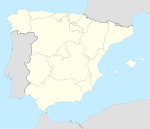Magaña (Soria)
| Magaña municipality | ||
|---|---|---|
 Magaña - town view with castle (castillo)
|
||
| coat of arms | Map of Spain | |

|
|
|
| Basic data | ||
| Autonomous Community : | Castile and Leon | |
| Province : | Soria | |
| Comarca : | Tierras Altas | |
| Coordinates | 41 ° 54 ′ N , 2 ° 10 ′ W | |
| Height : | 953 msnm | |
| Area : | 58.51 km² | |
| Residents : | 69 (Jan. 1, 2019) | |
| Population density : | 1.18 inhabitants / km² | |
| Postal code : | 42181 | |
| Municipality number ( INE ): | 42107 | |
| administration | ||
| Website : | Magaña | |
Magaña is a place and a municipality ( municipio ) belonging to the poorly populated Serranía Celtibérica with a total of only 69 permanent residents (January 1, 2019) in the north of the province of Soria in the east of the autonomous community of Castile-León in Spain .
Location and climate
The place Magaña lies on a hill above a river bend of the Río Alhama approx. 40 km (driving distance) northeast of the provincial capital Soria at an altitude of approx. 950 m . The climate is temperate to warm; Rain (approx. 635 mm / year) falls mainly in the winter half-year.
Population development
| year | 1857 | 1900 | 1950 | 2000 | 2018 |
| Residents | 468 | 494 | 501 | 103 | 73 |
As a result of the mechanization of agriculture , the abandonment of small farms and the resulting lower demand for labor, the number of inhabitants has decreased significantly since the middle of the 20th century ( rural exodus ). The hamlets (pedanías) Pobar and Villarraso with a total of approx. 35 inhabitants also belong to the municipality.
economy
The basis of the life and survival of the inhabitants of Magaña, who for centuries lived largely on their own , was and is agriculture, which of course also includes cattle breeding. Some of the vacant houses have been converted into holiday apartments (casas rurales) in the last few decades .
history
Celts or Celtiberians , Romans and Visigoths left no traces on the area of the high-lying community. The foundations of the keep of the castle are said to date from the time of the Moors . The 11th century is characterized by the Christian reconquest ( reconquista ) and resettlement ( repoblación ) the area that until the Peace of Almazán equally from the (1375) Kingdom of Aragon and Castile was claimed. The first documentary mention of the place comes from a document from 1181.
Attractions
- The Castillo de la Nava del Marqués or just Castillo de Magaña, which is located separately on a neighboring hill, is one of the best-preserved castles in the province of Soria. The keep (torre de homenaje) built on a square floor plan overlooks the town; it is the oldest part of the castle - its origins are traced back by some to the time of the Moors (10th / 11th centuries). The outer wall, which is stabilized and secured by semicircular projecting defense towers , dates from the 14th / 15th centuries. Century.
- The parish church (Iglesia de San Martín de Tours) with its unadorned western facade surmounted by a bell gable (espadaña) and its polygonal broken apse originally dates from the 13th century, but was fundamentally redesigned in later times. Inside there is a baroque altarpiece (retablo) .
- The Ermita de La Virgen de Barruso at the foot of the castle hill was probably originally the church of a small hamlet . The south-facing bell gable next to the entrance portal is unusual. The apse, angled to the north-east, has a small altarpiece and is frescoed from the 17th / 18th centuries. Century painted.
Web links
- Magaña, church and castle - photo + info (Spanish)
- Magaña, Castillo - Photo + Info (English)
- Magaña, Ermita - Photos + Info (Spanish)
Individual evidence
- ↑ Cifras oficiales de población resultantes de la revisión del Padrón municipal a 1 de enero . Population statistics from the Instituto Nacional de Estadística (population update).
- ↑ Fuentes de Magaña - climate tables
- ↑ Magaña - population development
- ↑ Magaña - History

